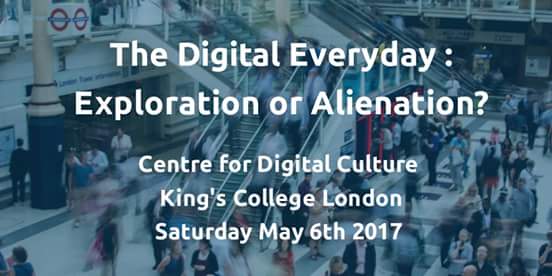 “From how we buy, walk around, get a cab, love, break up, go to bed, and meet new people to the way we rate services, turn on the fridge, exercise and eat – social media, apps, and Big Data are reshaping some of the most basic activities in our lives.”
“From how we buy, walk around, get a cab, love, break up, go to bed, and meet new people to the way we rate services, turn on the fridge, exercise and eat – social media, apps, and Big Data are reshaping some of the most basic activities in our lives.”
This conference will explore these digitally enabled transformations by looking at a
number of domains affected by these shifts: work and leisure, friendship and love, habits and routines. It will also explore a number of overarching dynamics and trends in the digital world that contribute to these transformations, including: processes of digital individualization and aggregation; the elisions of spatial and temporal barriers; trends towards quantification and datafication; and the dialectic between control and alienation.
The conference will will take place on Saturday, 6 May 2017 and will comprise two plenary sessions, 4 breakout panels, and keynote speakers.
Abstracts are due by 31 January 2017.
Key Questions Explored:
- Is digital transformation affecting everyday life?
- To what extent is this process one of increasing individualisation of social experience?
- Might there be something more complex happening?
- What are the new psychological and social pathologies that result from the digital transformation of everyday life and from processes of datafication and quantification?
- Is digital technology allowing for new forms of control over our everyday life or is it increasing alienation, making us overly dependent on infrastructures beyond our grasp?
- Is digital technology contributing to extending our freedom to choose, or is it stifling us with an overabundance of options?
- Is it guiding us to wards who we ‘really’ are or want to be, or is it plunging us into a hall of mirrors that only reinforces our isolation and narcissism?
- Is it facilitating exploration, serendipity and curiosity, or is it installing us into a pre-programmed and predictable world, into a filter bubble where choices can be more easily measured and manipulated?
Proposed paper abstracts may address the following topics:
- transformations of work patterns
- changes in everyday life routine (sleep, meals, etc.); fitness and sport activity
- love and sexual interactions
- friendship and acquaintanceship
- consumption and entertainment
- sense of place and time
- transportation and tourism
- play and leisure.
Abstracts should be 250 words maximum and include the author(s) name and position, and a short title. They must be submitted via EasyChair – https://easychair.org/conferences/?conf=digitaleveryday17
Acceptance notices will be given on 28 February 2017. Extended abstracts of 1,500 words are due on 15 April 2017 to be sent digitalculture@kcl.ac.uk
